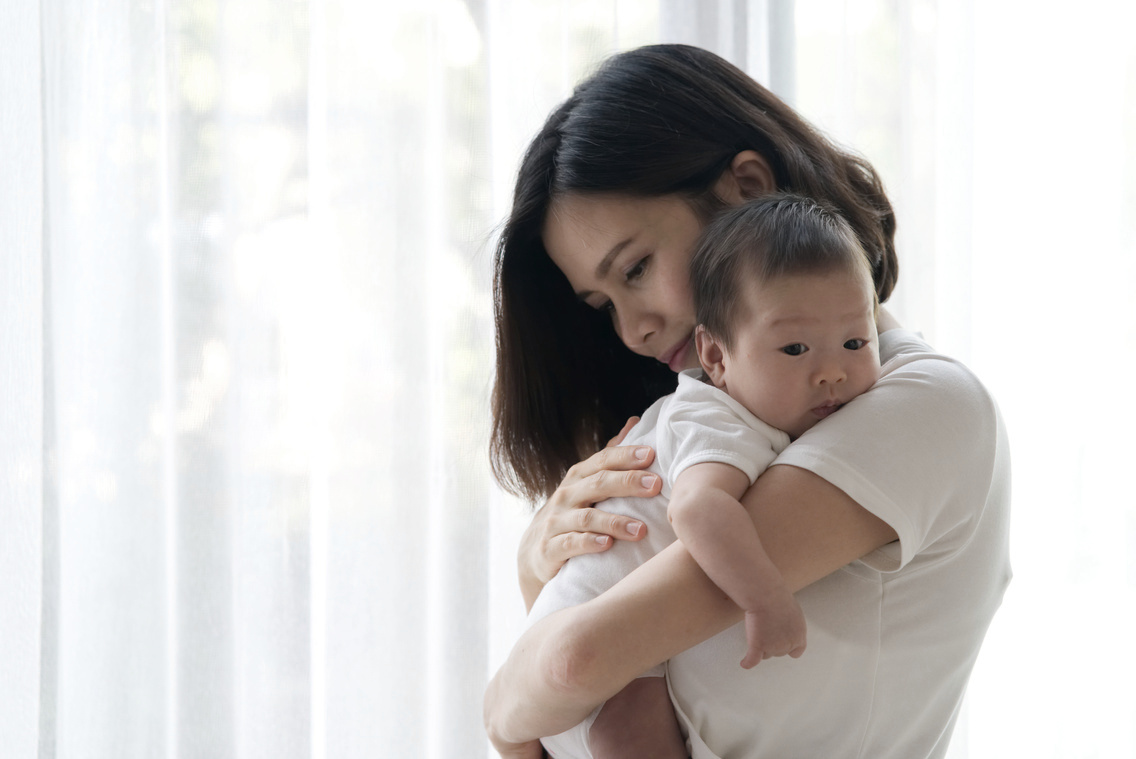More than the blues: Navigating postpartum depression

Whether you’ve given birth to your first child or you’re adding a member to your growing family, childbirth is a profound experience. After that, caring for a newborn is a round-the-clock endeavor — even if you’re prepared.
The transition from pregnancy to parenthood is called the postpartum period. For insight on what parents can expect in this period — and how to handle the ups and downs — we spoke with Dr. Andrea Sachs of Chestnut Hill Pediatrics in the Boston Children’s Primary Care Alliance.
What is the postpartum period?
A new parent’s hormones change rapidly in the postpartum period, especially in the first 48 hours after birth. In addition to hormonal changes, other physical changes may occur after giving birth may include:
- sore or inflamed breasts
- constipation
- hemorrhoids
- hot or cold flashes
- pain in the perineum
- hair loss
- vaginal discharge
- uterine contractions
Discuss these issues with your doctor if you have any concerns.
“In the first few days, many parents experience some degree of postpartum blues,” Sachs says. “They may feel anxious, sad, tired, weepy, or overwhelmed for a few days or a week. But if severe negative feelings last more than two weeks, that could signal postpartum depression.”
Signs of postpartum depression
Postpartum depression can affect any new parent, but those who have had depression in the past (including postpartum depression with another child) or a family history of depression are at greater risk. “People who have had a miscarriage or abortion can also experience the symptoms of postpartum depression,” Sachs adds.
Every new parent is different, but common signs of postpartum depression include:
- feelings of sadness, fear, worry, anger, or hopelessness
- crying episodes (uncontrollable crying)
- changes in sleeping or eating habits
- difficulty focusing
- overwhelming fatigue
- isolating from friends, family, or children
- lack of interest in their infant
- thoughts of death or suicide
Postpartum depression can last anywhere from a few weeks to several months. Although many cases resolve in a few months, some parents report symptoms a year or more after birth.
Causes of postpartum depression
Research doesn’t point to one single cause of postpartum depression. It’s likely a combination of physical, emotional, genetic, and social factors.
“Hormonal changes and sleep deprivation affect the body” Sachs explains. “Emotional and social factors come into play, too. That includes everything from the stress of childbirth, to the amount of support at home, to the dynamic between new parents.”
Treating postpartum depression
It’s important to seek treatment right away if you suspect postpartum depression. Treatment can include counseling and medication. Your doctor may also order blood tests to make sure something else isn’t causing the symptoms.
“The sooner treatment begins, the sooner the parent can fully enjoy their new child,” Sachs says. “Don’t be ashamed or afraid to reach out to your doctor or your baby’s pediatrician. You don’t have to wait for your next appointment.”
Self-care can also help. New parents should work on getting adequate sleep, eating well, exercising, and taking some time to relax. To make this happen, enlist family and friends to help with errands, chores, and child care.
You know your body
One of the best ways to care for a baby is to take care of their parents. If you or someone you know is having a baby, make a plan to support the family before the baby arrives, and remember the signs of postpartum depression.
After giving birth, if something doesn’t feel right, don’t ignore it. Your pediatrician and their team can be a valuable resource for you and your newborn alike.
Boston Children’s Primary Care Alliance practices offer support for new parents. Find a practice near you.
Related Posts :
-

Which pain medication is right for your child? What a pediatrician wants parents to know
There’s no shortage of safe and effective pain medications for children. Acetaminophen (commonly known as Tylenol), ibuprofen (Motrin, Advil), ...
-

EarlyBird: Addressing dyslexia through game play
Up to 10 percent of the population has dyslexia, yet many children are diagnosed only after struggling with reading for years. ...
-

Four ways to support your teen’s mental health
Being a teen is hard enough, but with the current adolescent mental health crisis, parents should know about the psychosocial ...
-

Beyond expectations: Treating Isaac’s teratoma through an EXIT procedure
Jennifer worked as a hairdresser until just days before delivering her son, Isaac, last December, even though she had planned ...





